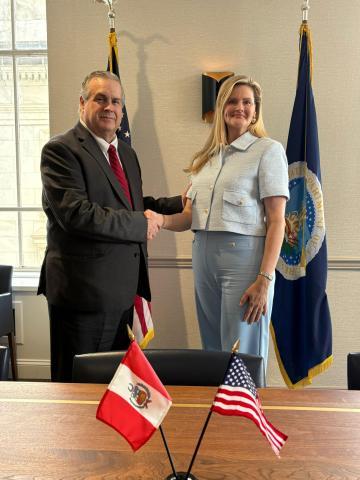Celebrating World Trade Month: The Trump Administration’s Approach to Expanding Exports and Supporting Rural Prosperity

I am honored to serve as the newest member of the U.S. Department of Agriculture's (USDA) Trade and Foreign Agricultural Affairs mission area in my role as Deputy Under Secretary. As a native of Iowa, where agriculture is our lifeblood, I understand this position is a sacred trust and my duty to the American people, farmers, ranchers and producers.
Each May, the United States celebrates World Trade Month, a time to reflect on the vital role international trade plays in our economy, particularly in the food and agriculture sector. The Trump Administration remains committed to expanding agricultural exports, recognizing the progress made and the challenges ahead. Exports are a pillar the U.S. farm economy, with nearly half the soybeans, wheat and rice produced here destined for international markets. Additionally, 70-80% of U.S. cotton and tree nuts, along with significant portions of livestock products and fruits are sold overseas. Without these foreign markets, American agriculture would experience lower prices, leading to reduced production and weaker rural economies. That is why expanding agricultural exports remains a top priority for this administration.
Beyond the economic figures, trade policies shape the fabric of our rural communities, supporting jobs, and preserving the way of life for millions of hardworking Americans. A strong, successful trade policy creates an ecosystem which benefits all stakeholders including farmers, ranchers, suppliers, service providers, and the businesses on the main streets of America.
Under President Trump’s leadership, the administration’s America First trade policy creates new opportunities for U.S. agricultural products in the global marketplace. The United States has roughly a $50 billion agricultural trade deficit, and yet America’s farmers and ranchers are the most productive in the world. By confronting unfair trade practices and calling for reforms, the administration is reinforcing the strengths of U.S. farmers and ranchers who are globally competitive and keen to expand the reach of their bounty.
Secretary Rollins has shown how dedicated she is to addressing these issues through her aggressive international travel agenda. She recently made her first stop in the United Kingdom, where she advocated for American farmers and ranchers, and celebrated President Trump’s historic trade deal with the U.K.

This is just the beginning of new opportunities for American agriculture around the world.
USDA plays a key role in the trade negotiations attracting headlines today, but its commitment to supporting exports extends beyond diplomacy. It includes programs that help farmers adapt to changing market conditions, investments in research and development, and regulatory measures that ensure safe, high-quality products that make American agriculture competitive on the world stage. Preventing disease and protecting products and ecosystems from pests not only supports a strong American agricultural sector, but it also assures foreign customers that U.S. products are safe and wholesome. Strengthening marketing infrastructure further boosts American producers’ ability to thrive internationally.
As we celebrate World Trade Month, USDA is recommitting to President Trump’s vision of trade policies that uplift American farmers, ranchers, and producers. Though challenges persist, our nation is blessed with the best farmland, products, and supply chains in the world. With an opportunity to compete fairly in the global marketplace, America’s farmers will continue to lead the way.
